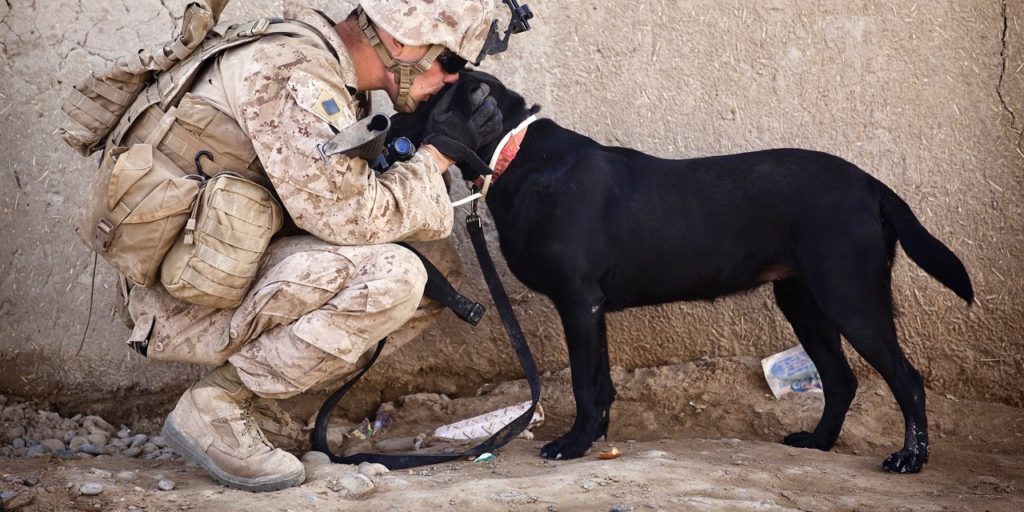Written by Michael Shannon O’Keefe
Isolation is a natural reaction to depression and grief. If you’re in the depths of depression, it’s can be hard to pick up the phone and call a friend. If you’ve lost a loved one, your good health, or a relationship, you may pull inward and grieve alone.
Just because isolation can be natural doesn’t mean it’s good for you. Isolation can create a spiral of despair. Depression and grief often cause people to cut themselves off from friends and family, which in turn causes more depression and grief, and so on.
Talk therapy and medications are the standard treatments for these afflictions. Recent research, however, points to an additional form of help, which has been called the pet effect. Simply put, being around animals often helps people feel less isolated, depressed, and grief-stricken.
The Pet Effect: It’s Real
Steven Feldman, the Executive Director of the Human Animal Bond Research Institute and a contributor to the website of the Anxiety & Depression Association of America, writes:
Positive human-animal interaction is related to the changes in physiological variables both in humans and animals, including a reduction of subjective psychological stress (fear, anxiety) and an increase of oxytocin levels in the brain. Science demonstrates that these biological responses have measurable clinical effects.
In layman’s terms, people feel better when there’s an animal around.
These findings are illustrated in numerous stories of animals bringing comfort and redemption in the aftermath of traumatic events. Many parents, families, and significant others of fallen servicemen and women have sought solace in the company of animals. The Tragedy Assistance Program for Survivors (TAPS) has collected a number of poignant tales about the ways dogs have helped people cope with tragedy and loss. One mother wrote about finding comfort in the company of her fallen son, Caleb’s dog:
Griz is a comfort to have, especially since he is Caleb’s dog. He has comforted me just by being here. He doesn’t try to give me advice or tell me it’s going to get better or any other cliché. He’s just here and available. When I cry, he is right there… I remember those early days when I’d sleep for a little bit and wake up crying. I could reach out and just hold onto him while my whole world was shredded to pieces. I am forever grateful for this sweet dog who has helped and continues to help me on this difficult journey.
Service members who have been wounded or who suffer from PTSD have also found that having an animal companion can help them manage their symptoms and give them a different outlook on life. One charitable group, K9s For Warriors, has been training and matching rescue dogs with psychologically wounded soldiers since 2011.
The pet effect seems to be capable of relieving suffering that is both mental and physical. The Human/Animal Pain Interaction Research Team at the University of Calgary is especially concerned with the question of how people with chronic pain benefit from being pet parents. Led by Eloise Carr, PhD and Jean E. Wallace, PhD, the team looks at the ways dog companionship impacts physical pain and psychological anguish. Living with chronic pain often leads to depression, which in turn makes the experience of the physical pain more intolerable. On this, Dr. Wallace says,
Even if we can’t reduce the pain, if we can reduce depression and improve mental health, there are benefits in terms of looking at how you get up in the morning and want to do things. Some people we interviewed were suicidal; they were thinking about taking their own lives but what stopped them was having a dog and having to care for that creature. Having a dog is so central to giving them a meaning and purpose.
People who live in assisted care facilities also benefit from the pet effect. Dogs and other animals have become welcomed, regular visitors–and even residents–in nursing homes. This isn’t surprising; anyone who’s ever taken a dog into a nursing home or hospice knows what joy they bring to the residents there.
According to NurseBuff.com, there are three general types of pet therapy in elder care settings: visitation therapy, where animals (usually cats and dogs) visit nursing homes periodically; animal-assisted therapy, where highly sensitive animals are paired with patients who require intensive rehabilitation; and ownership therapy, where residents take full charge of caring for a pet.
One nursing home study found that “Dog-assisted therapy addressed some of the unmet needs of participants by providing meaningful activity, stimulation, pleasurable social interaction, and comfort through physical contact.”
How Does the Pet Effect Work?
While there’s little doubt anymore that interacting with animals has a positive effect on people’s state of mind, there’s still much to learn about how and why it happens. Therese Borchard, the founder of Project Hope & Beyond and an Associate Editor of PsychCentral.com, offers six reasons the pet effect works:
- Pets offer a soothing presence
- Pets offer unconditional love and acceptance
- Pets alter our behavior
- Pets distract
- Pets promote touch
- Pets make us responsible
There’s also a wealth of scientific research that explains the pet effect in physiological terms. Pet Partners, a Bellevue, Washington organization dedicated to promoting the use of animals as part of the healing process, has documented an impressive number of ways having a companion animal results in positive health outcomes. Among many other benefits, companion animals lower blood pressure, result in higher one-year survival rates following heart attacks, may result in a reduction in the risk of cardiovascular disease, and are associated with a reduced risk for non-Hodgkin’s lymphoma and diffuse large cell lymphoma.
What About People Who Can’t Have Pets?
Emotional support animals have become more accepted in the last decade. It’s not uncommon for landlords who have no-pets policies to make exceptions for emotional support animals. But we still have a way to go before companion animals are welcome everywhere. Additionally, some people love animals and benefit from interaction with them, but are allergic to them or have household members who are.
The good news for people who would benefit from animal contact but who can’t have a pet is that even occasional contact with animals has positive health effects. Two researchers from Virginia Commonwealth University, Sandra Barker and Aaron K. Wolen, investigated the effects of occasional animal interaction on human health. They found that most studies report a decline in blood pressure declines when people interact with dogs. Interestingly, the effect works even with people who have short-term contact with animals:
Japanese researchers [studied]seniors walking in a park either alone or with a research dog. Their results demonstrated that the dog’s presence in the park, as well as at home, increased parasympathetic neural activity, which is generally associated with stress reduction.
There are several ways to get the psychological benefits animals provide without living with a companion animal. Volunteering at a local animal shelter or becoming a professional pet sitter or dog walker gives people some of the pet effect’s benefits without creating conflicts with landlords and neighbors or constantly subjecting people to allergens. Many animal-related organizations such as sanctuaries and shelters welcome volunteers, and this sort of service not only offers a chance to be around animals, but also to give back to animals in need.
Animals on the Healer Team
Mood disorders, chronic pain, and grief are complicated and serious conditions. No one would seriously suggest that people should replace psychiatric, psychological, and medical treatment with puppies. Rather, treating these conditions is now recognized as a team effort. Doctors and counselors play a role, just as family members and friends do. But animals can be important team members as well.
It’s important to remember that part of valuing our companion animals, who enrich our lives so much, is thinking about how our choices affect their lives and the lives of other animals like them. Please adopt your next animal, rather than buying them from a pet store or breeder, which drive up pet overpopulation when so many animals already need homes.
Evolutionary biologists teach us that dogs evolved alongside humans. Over the course of tens of thousands of years, they have become very good at reading and responding to human emotions. Their survival often depended on it. Today, that psychological connection is helping people cope during dark episodes of their lives. Animals have earned their place alongside other healers. We shouldn’t hesitate to turn to them for help.
Featured image and all other images in this story via ConsumersAdvocate.org.









1 Comment
Gzooh kitchens is a popular Ghost Kitchen in Canada. Gzooh Kitchens offers Ghost Kitchen solutions to restaurants, eateries, cloud kitchens, small food businesses, and more.